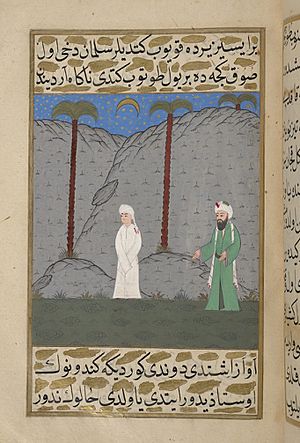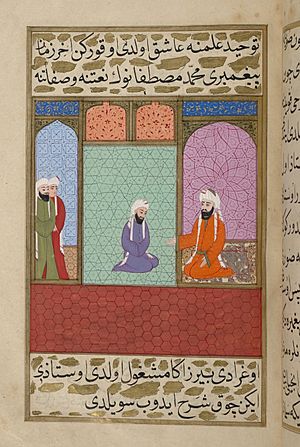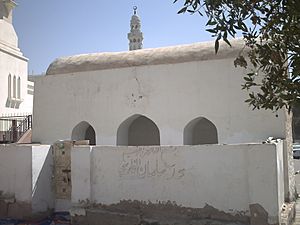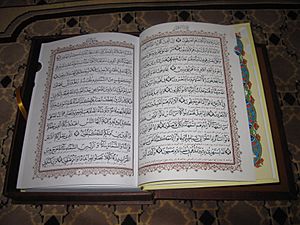Salman the Persian facts for kids
Quick facts for kids
Salman the Persian
|
|
|---|---|
| سَلْمَان ٱلْفَارِسِيّ | |
 |
|
| Born | 568 AD |
| Died | 32 AH/652 or 653 AD |
| Burial place | Salman Pak, Al-Mada'in, Iraq (Or Lod, Jerusalem, Isfahan, or elsewhere according to other sources) |
| Known for | Being a companion of Muhammad and Ali |
|
Works
|
Partial translation of the Quran into Persian |
| Title |
|
| Children | Abdullah |
Salman the Persian, also known as Salman al-Farsi, was an important companion of the Islamic prophet Muhammad. His birth name was Roozbeh, which means "good day" in Persian. He was the first person from Persia to become a Muslim.
People sometimes called him Abu Abdullah, meaning "Father of Abdullah." Salman is famous for suggesting a clever military idea: digging a trench around the city of Medina. This helped protect Medina when it was attacked in the Battle of the Trench. Salman grew up following a religion called Zoroastrianism. Later, he became interested in Christianity. Finally, he converted to Islam after meeting Prophet Muhammad in the city of Yathrib, which is now known as Medina.
Salman's Early Life and Journey

Salman al-Farsi was born in Persia (modern-day Iran). Some say he was born in Kazerun, while others say Isfahan. For the first 16 years of his life, he studied to become a Zoroastrian priest. This was a very respected job at the time.
Around the year 587, he met a group of Nestorian Christians. He was very impressed by their beliefs. Against his father's wishes, Salman left his family to join them. His family tried to stop him by putting him in prison, but he managed to escape.
Salman traveled across the Middle East, talking to priests and scholars. He was searching for the truth about religion. During his travels in Syria, he heard about Prophet Muhammad. His last Christian teacher had even predicted Muhammad's coming.
On his way to the Arabian Peninsula, Salman was tricked and sold to a Jewish person in Medina. After meeting Muhammad, Salman recognized the signs his teacher had told him about. He then became a Muslim and gained his freedom with Muhammad's help.
Some people called Salman "Abu al-Kitabayn," meaning "the father of the two books." This referred to his knowledge of both the Bible and the Quran. Others called him "Luqman al-Hakeem," which means "Luqman the wise." Luqman was a wise man mentioned in the Quran.
Salman's Role in History
Salman came up with the idea of digging a large trench around the city of Medina. This was to defend the city from an army of 10,000 non-Muslim Arabs. Muhammad and his companions agreed to Salman's plan. They thought it was a safer way to protect the city and would cause more trouble for the attacking army.
Salman also took part in the conquest of the Sasanian Empire. He became the first governor of the Sasanian capital city after it fell. This happened during the time of the second leader of the Muslim community, known as a Caliph.
After Muhammad's death, some sources say Salman stayed out of public life for a while. But then, in 656 AD, he was appointed as the governor of Al-Mada'in when he was 88 years old.
During the Battle of the Trench, there was a friendly debate among the Muslims. Some said Salman belonged to the group who had moved from Mecca (the Muhajirun). Others said he belonged to the Muslims of Medina (the Ansar). Muhammad heard their discussion and settled it by saying, "Salman is neither Muhajir nor Ansar. He is one of us. He is one of the People of the House." This showed how highly he was regarded.
Salman's Contributions
Salman was the first person to translate parts of the Quran into Persian. This made it possible for people who spoke Persian to understand the holy book.
Salman's Death
The exact date of Salman al-Farsi's death is not fully known. It was likely between 652 and 656 AD. Some sources say he died during the rule of Uthman, another Caliph. Others say he died during the rule of Ali.
His tomb is believed to be in Salman Al-Farsi Mosque in Al-Mada'in, Iraq. However, some other places like Isfahan and Jerusalem are also mentioned as possible burial sites.
Different Views on Salman
Shia View
Followers of Shia Islam, especially the Twelvers, respect Salman very much. They believe he was told the names of all twelve future leaders (Imams) by Muhammad. Shia scholars see Salman as a true example of Islamic spirit.
Sufi View
Salman is also a very important figure in Sufism, which is a mystical branch of Islam. Many Sufi groups trace their spiritual teachings back through Salman to Muhammad. He is often seen as a key link in their spiritual chain.
Baháʼí View
In the Baháʼí Faith, Salman is honored for his role in predicting the coming of Muhammad. Baháʼu'lláh, the founder of the Baháʼí Faith, mentioned Salman's journey and his search for truth.
Ahmadiyya View
In Ahmadiyya Islam, Salman the Persian is respected for a prophecy related to people of Persian origin. It is believed that if faith were very far away, even in the stars, people from Salman's community would still reach it.
Images for kids
See also
 In Spanish: Salmán el Persa para niños
In Spanish: Salmán el Persa para niños
 | Charles R. Drew |
 | Benjamin Banneker |
 | Jane C. Wright |
 | Roger Arliner Young |





